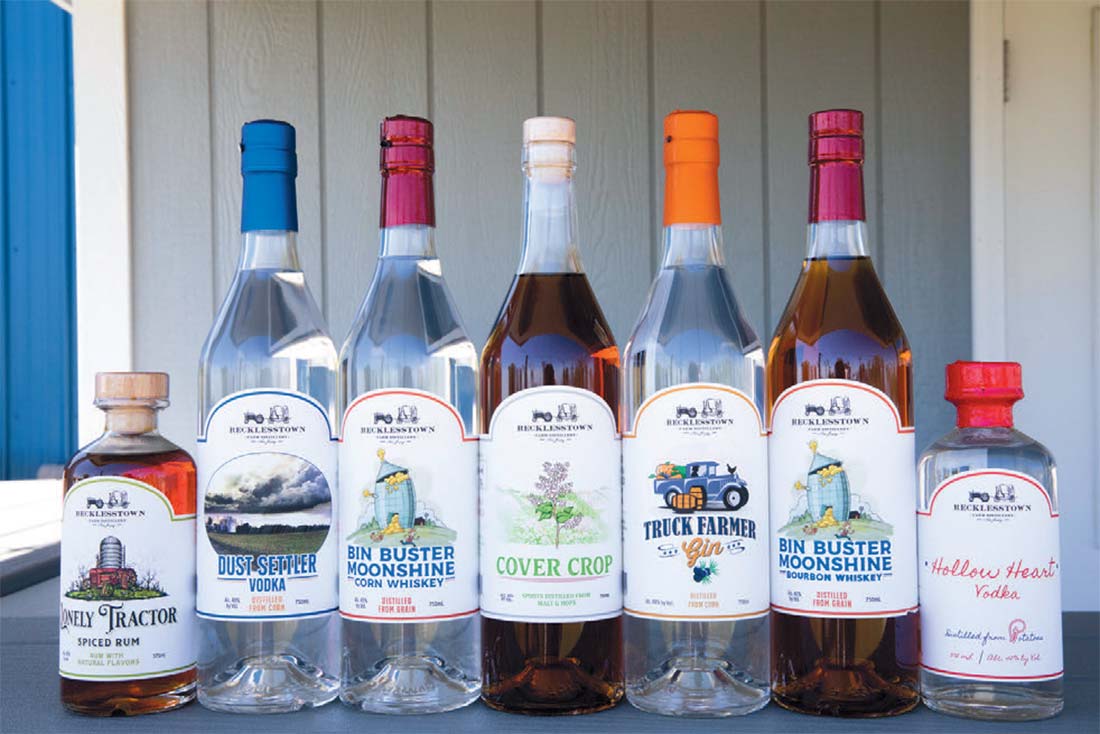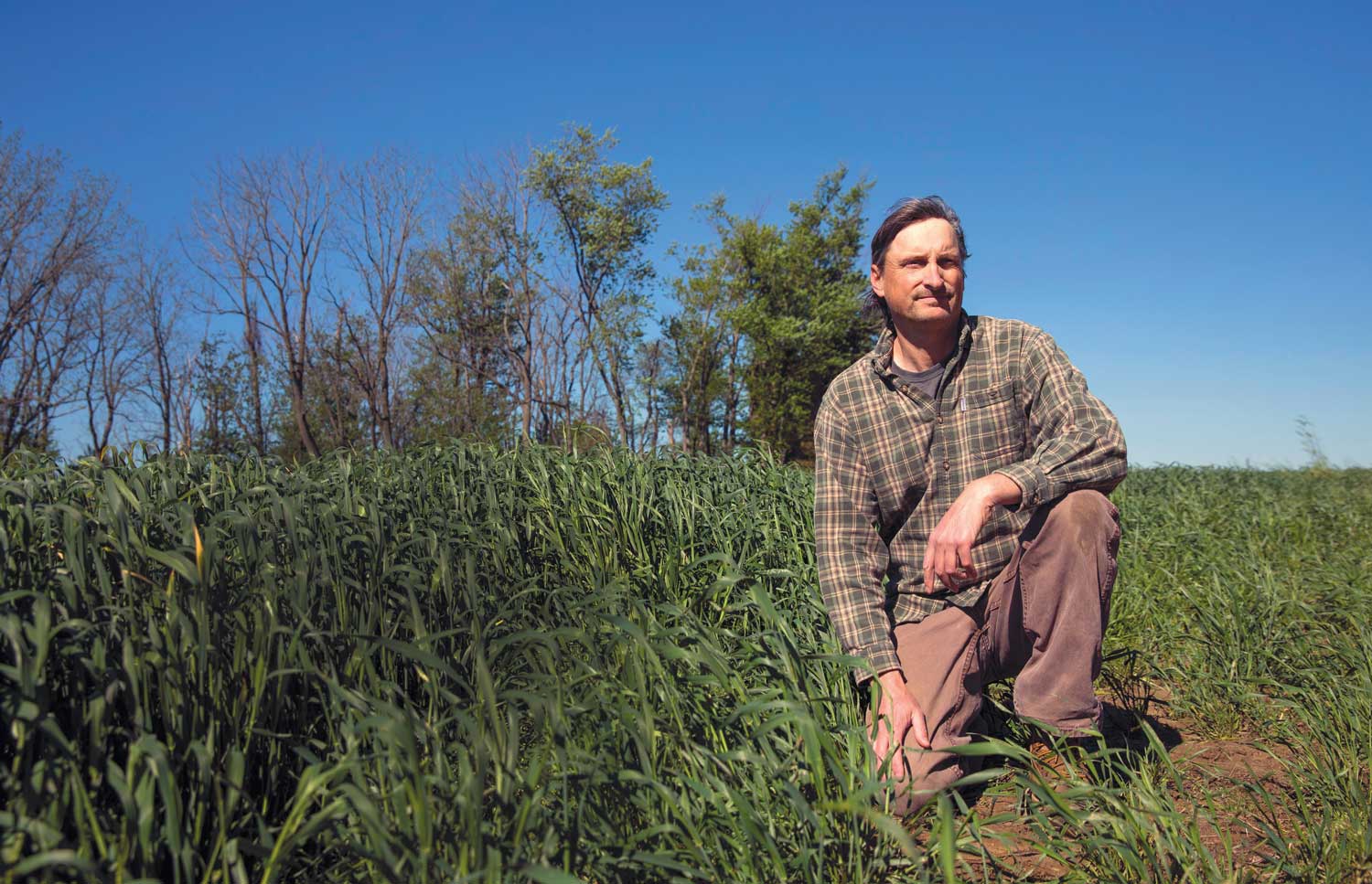Shaking Up the Future of Farming at Recklesstown Farm Distillery
As one drives south along Route 206 in northern Burlington County, the challenge of balancing farmland preservation with community services in a densely populated state is on full display. A leader in protecting New Jersey agricultural land, the county has successfully maintained some increasingly rare views of sweeping farm fields that stretch from horizon to horizon. And yet, at every intersection sits a commercial enterprise—convenience store, gas station, diner—that is completely disconnected from that landscape even as it provides needed services, revenue, and jobs.
At one corner, however, right across from the county fairgrounds, an innovative local farmer has found a way to balance preservation and commerce by creating a venue that invites the community to sit, enjoy the view, and become part of that landscape by tasting a distillation—quite literally—of that place.
In his 1933 address to a meeting of New Jersey farmers, C.B. Probasco delivered a prescient piece of advice. As the state’s largest potato grower, he encouraged farmers in the Central Jersey potato belt to make use of seasonal downtime and increase their revenue by growing additional items, such as asparagus. Within 15 years, rising competition and costs sent the once profitable market for Jersey potatoes into a steady decline, leaving many growers to choose between selling their land or switching to other crops.
Probasco’s farm survived the purge and, 90 years later, his great-grandson, John Probasco, still grows a lot of potatoes, as well as corn, pumpkins, soybeans, and wheat. Most of his potatoes are sold to chip manufacturers, such as Herr’s. But a portion of them, along with some of his corn, are diverted to his family’s newest venture, Recklesstown Farm Distillery in Columbus. There they are distilled into spirits that are bottled for sale—or mixed with local fruits, flowers, and herbs to create craft cocktails that celebrate the seasons and flavors of the Garden State.
Recklesstown Farm Distillery’s name comes from the original name for Chesterfield, where the Probasco’s home farm is located. (That name references a town founder, Joseph Reckless, not the behavior of town residents.) Probasco, whose family has farmed in New Jersey for over 300 years, currently cultivates almost 3,000 acres of owned and rented land, spread across multiple parcels. One of the pieces of preserved farmland that he owns includes a commercial corner along Route 206, which is bounded on two sides by Probasco’s fields. “When we bought it, we had no idea what we were going to do with this [corner],” Probasco says. “It was 2013, we had no use for a commercial location whatsoever.” A kitchen table conversation with friends soon changed that.
“We originally started with very dear friends who are involved in the flavor and fragrance industry,” says Denise Nadeau, Probasco’s wife. “We do a lot of things together and we had been to some distilleries. The conversation started as ‘we can do this.’ We had the raw ingredients and, because of their experience with flavors and fragrances, they had some experience with distillation. We figured that we could piece it together, so that’s how it started.”
The business was officially formed in 2016, followed by a year of paperwork and planning. During the planning time their friends decided that they needed to drop out.
“We had to decide if we were going to go forward, just the two of us, or if we were going to let it go,” Nadeau says. “Being the kind of nutty people we are, we decided we would keep going. So, the two of us have put one foot in front of the other and tried to figure all this stuff out.”
While researching the distilling industry, Probasco and Nadeau visited Cooper River Distillers in Camden, which had received New Jersey’s first craft distilling license in 2014. There they met Ben Donia (opposite, bottom), who they hired as a consultant to help them figure out the type of equipment they’d need to process raw ingredients into finished alcohol. When Cooper River owner James Yoakum decided to close his distillery, Donia was invited to become the future distiller at Recklesstown.
When Donia arrived at Recklesstown in fall 2018, it was a construction site with freshly installed drywall. In addition to working out design specs with the still manufacturer and formulating recipes for the spirits, Donia helped with the finishing of the tasting room walls and floors, as well as the addition of decorative details, including a framed burlap sack boldly labeled “Probasco’s Premium Potatoes”—an artifact from the days when households purchased potatoes in 100-pound bags. The still arrived on New Year’s Eve and production of spirits began a few months later. “It’s very rewarding,” Donia says, “to have a project that you’ve been a part of from the jump.”
By law, Recklesstown is allowed to make any distilled spirit, but not fermented products such as beer and wine. The style and configuration of their still allows Donia to make a wide range of spirits, which currently includes two vodkas (one from corn, the other from potatoes), two aged bourbons, an unaged bourbon (moonshine), gin, spiced rum, and a distilled IPA made in collaboration with Spellbound Brewery of Mount Holly. Because they purchased Cooper River’s remaining inventory, Recklesstown also bottles a rum and a bourbon under the Cooper River label, and they have a supply of Cooper River brandy, which they use to make infusions and bitters.
UNLIKE A WINERY OR BREWERY, A DISTILLERY’S PRODUCTS ARE MOSTLY USED AS AN INGREDIENT, RATHER THAN ENJOYED STRAIGHT—MAKING THE RECKLESSTOWN TASTING ROOM’S COCKTAIL PROGRAM AN ESSENTIAL TOOL FOR SHOWCASING THEIR SPIRITS.
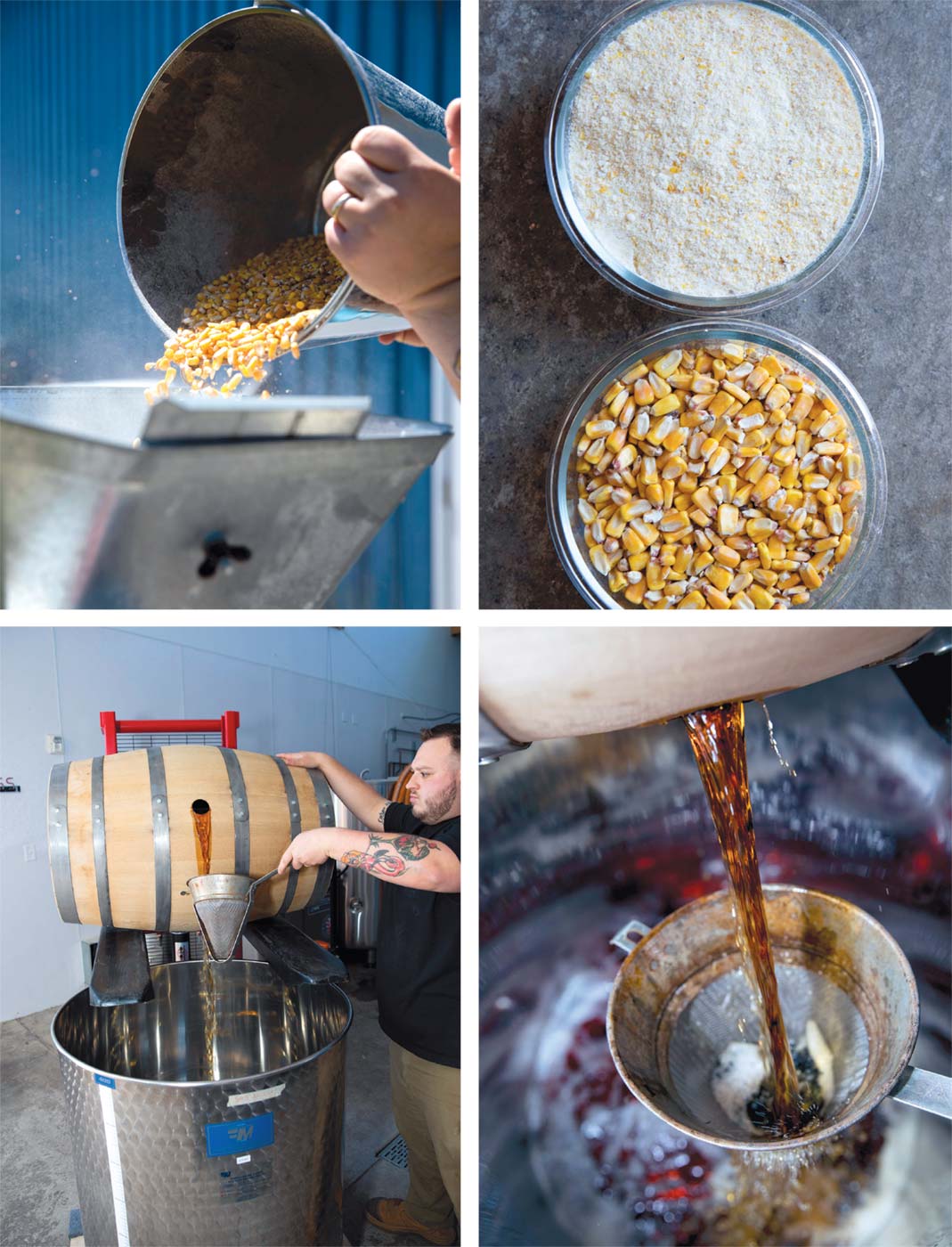
It is perfectly legal, and not uncommon, for a craft distillery to purchase distilled spirits and then refine those spirits in-house. But, true to its motto of “Tilled, Milled & Distilled on OUR Farm,” Recklesstown’s spirits are made from raw ingredients grown on the Probasco’s farm (with the exception of their rum, which is distilled from molasses they purchase from Pennsylvania.) The rye portion of their bourbon mash is from neighboring farms and the malt comes from Rabbit Hill Farms in Shiloh (see “Barley There”, Edible Jersey, Fall 2021), fellow potato growers that Probasco has known for many years.
Unlike a winery or brewery, a distillery’s products are mostly used as an ingredient, rather than enjoyed straight—making the Recklesstown tasting room’s cocktail program an essential tool for showcasing their spirits. “We only do one gin,” Donia says. “But we have the benefit of the cocktail bar. Every season we go to the farmers’ markets and we can change the cocktails to give you a different flavor with that particular gin.”
In preparation for the July 2019 opening, Donia recommended hiring Carla Camerieri to develop the cocktail menu. A former Cooper River employee and certified wine educator trained at the French Culinary Institute, Camerieri’s creativity is evident in her playful monthly cocktail selections. And, because Recklesstown is only allowed to serve distilled spirits that they produce, she also shows remarkable ingenuity in the creation of secondary spirits that are used behind the bar. [See sidebar]
“What we cannot access in back bar spirits, we have to get to in a different way. Often tinctures, infusions, or syrups, in particular, can get us there,” Camerieri says. “That piece of it has stretched me creatively and has really opened the world up in terms of things you can do when necessity demands.”
In order to offer a Negroni-style cocktail, for example, Camerieri had to create a substitute for both Campari and sweet vermouth. As a stand-in for Campari, she relies on Sanbitter, an Italian aperitif soda, and an infusion of grapefruit into Recklesstown’s Truck Farmer Gin. Creating a stand-in for sweet vermouth was a far greater challenge, involving nonalcoholic wine plus an infusion of spices, herbs, and bittering agents into brandy. “That is a real matter of pride for me because for a distillery to be able to make a vermouth is way out there,” Camerieri says. “You would think it would be beyond reach because vermouth is a fortified, aromatized wine—and normally wine would be not accessible to us. That was really a great moment to be able to pull that off.”
Having Donia as a collaborator has proved to be invaluable to Camerieri. The two are engaged in an ongoing conversation about flavor and how to stretch the creative potential of their product line, such as drawing on the smoky notes in Recklesstown’s Bin Buster Moonshine to create a substitute for tequila and exploring ways to take advantage of Bin Buster Bourbon’s toasted, chocolatey notes.
As a distiller and as a cocktail developer, both are grateful for the advantages that come from working directly with a farm. That connection gives Donia a reliable supply of raw ingredients that are fresh, clean, and of the highest quality. It also gives him access to a farmer’s equipment and practical knowledge. “Anything I could possibly need—any tool, any piece of equipment—is a call to the boss man and he shows up,” Donia says. “If we get the forklift stuck in mud, all of a sudden a 12-foot tractor shows up and yanks it out.” For Camerieri, the wide open view of the farm fields that surround the distillery is a source of creative inspiration, as well as an ideal setting in which to take cocktail photos. “Having the farm as the background for so many of our pictures gives our cocktails a sense of place,” Camerieri says. “There is very much that sense of the outside coming in. It is kind of metaphorical for what we do with our cocktails.”
The ingredients in Camerieri’s cocktails follow along as the local seasonal bounty flows from honeysuckle and lilac blossoms in spring, through the abundance of summer berries, herbs, and melons, to fall’s orchard fruits and storage crops. And Probasco’s deep roots in his farm community help make the procurement of those seasonal items much easier. “That goes back to my husband’s relationships,” Nadeau says. “He sat on the Burlington Board of Ag. He has grown up here, so, basically, knows everybody and vice versa. We’ll get a call from, say, Rose Robson from Robson’s Farm [in Wrightstown] and she’ll say ‘Hey, I’ve got a lot of quince. Do you need any?’ I’m, like, ‘Sure! Why not?’ It’s been fabulous!”
Those close relationships lead to direct conversations with growers about subjects such as which varieties of blueberries are most flavorful while also being available in the volume needed to make the fresh juices that are a staple in Recklesstown’s cocktails. And the distillery’s proximity to so many farms means that ingredients arrive at the bar just minutes or hours after harvest. “It absolutely makes a difference in the taste. It brings a freshness to the cocktails,” Camerieri says. “And that roll through the seasons—we can get philosophical, but I think we need to pay more attention to what is seasonal and what is cyclical and how that dovetails into our own lives.”
Their list of future plans includes the creation of a demonstration garden that explains the path from the fields to the distillery. That garden will include herbs, flowers, and other aromatics that are used to flavor gin and cocktails, as well as patches of the corn, potato, and wheat varieties that are used to make Recklesstown’s spirits.
“A lot of consumers have no idea. They haven’t been on a farm, particularly a grain farm where you would see these things and see how they’re grown,” Nadeau says. “Our end goal is to have the whole picture. We put the seeds in the ground, and this is what results—the end harvest will get put in a [grain] tote and this gets ground into the mash that is going to go into your bourbon.”
Probasco can often be found working behind the bar at Recklesstown. Although climbing down off the tractor to make cocktails might not have been what C.B. Probasco had in mind when he encouraged farmers to diversify, the farming community has been very receptive to the distillery. Various agricultural entities use the tasting room to hold meetings and presentations—giving them a place where, Nadeau notes, “they can enjoy a cocktail that they know came from corn in the fields outside.” And, Probasco says that, since they opened, seven or eight farmers have stopped in to ask about the upsides, downsides, and logistics of opening a farm distillery.
Nadeau points out that Burlington County has many younger farmers who are taking over the family farm and bringing in new approaches and ideas. She also notes, with a laugh, that the Probasco family has long enjoyed a reputation in the farm community for trying new things. “They’re kind of used to the Probascos doing their own thing,” she says. “I don’t know that [the distillery] was a shock to the agricultural community locally.”
Despite the family’s reputation for embracing change, it took a while for Probasco’s father to warm to the distillery idea. “It’s so far outside what my family’s always done that it’s a little hard for him to understand,” Probasco says. “But he would tell you that about everything that we do in the farming now. Everything is just so much more expensive, so much different than what it was when he was younger.”
In the face of the evolving challenges confronting this generation of New Jersey farmers, Probasco echoes the same concerns—and, perhaps, foreknowledge—that his great-grandfather did when advocating for trying new approaches. “I think a lot of farmers are looking for that other component to their business to set them apart,” Probasco says. “There’s an interest level there for a place to go in the future as farms become a little less plentiful in the area.”
By placing a field-to-glass distillery and cocktail bar amid New Jersey farm fields, the Probasco family has built an example of on-farm innovation. And they have given residents a way to support New Jersey farmers through the direct experience of seeing and tasting the value—and pleasure—that farming brings to our state.
Recklesstown Farm Distillery
2800 US-206, Columbus
609.784.8046
recklesstownspirits.com
Hours: Fri., 4-10pm; Sat. 2-10pm; Sun.12-6pm.
Distillery does not serve food. Food trucks on site only on Friday nights; customers are always allowed to bring food or have food delivered. Must be 21 years or old. Dogs not allowed.
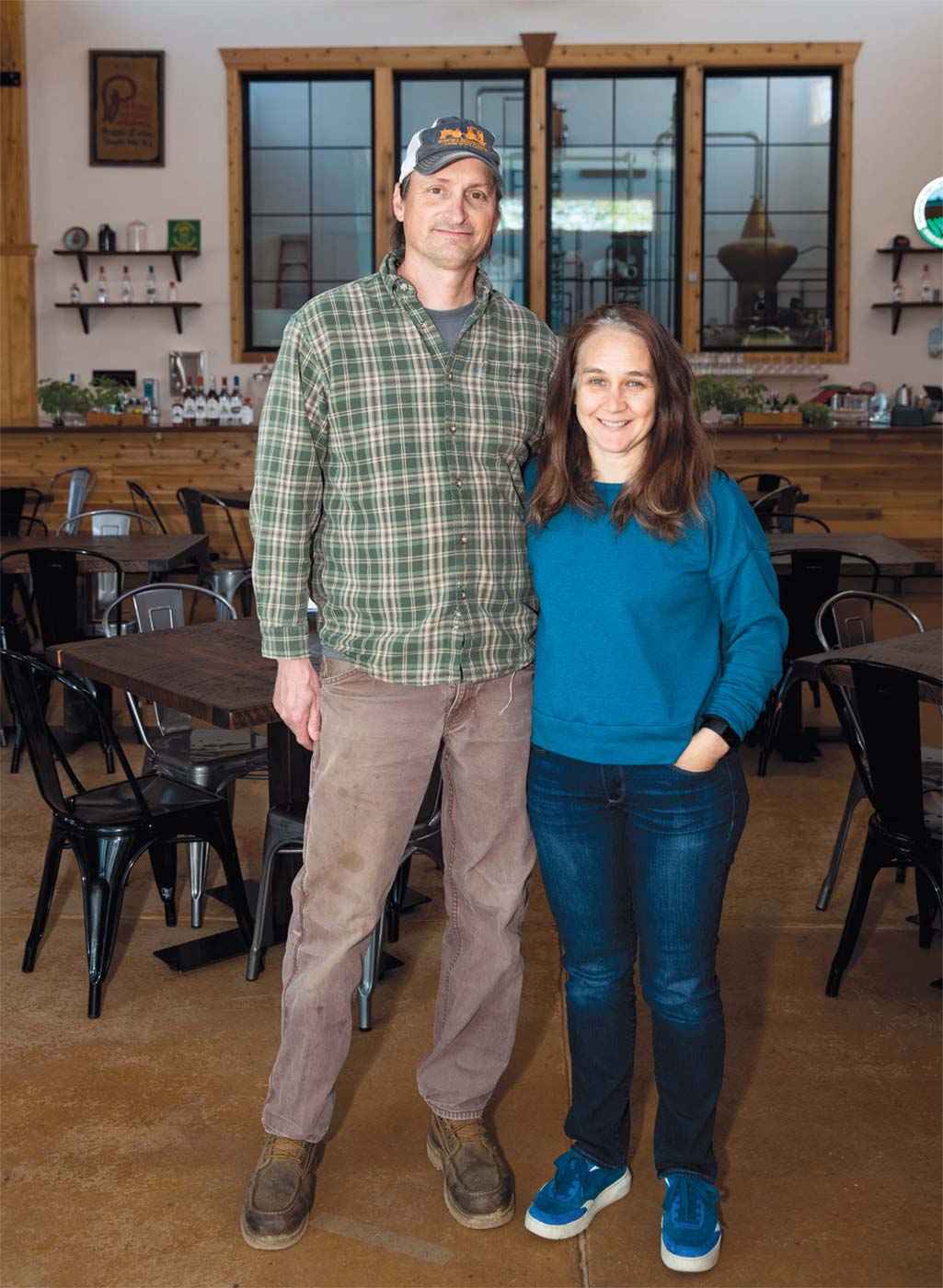
John Probasco and Denise Nadeau
FARMING: ADAPTING TO CHANGING MARKETS
From environmental impacts to changes in consumer preferences, a wide range of factors can impact crop viability. Farmers must be able and willing to adapt when necessary.
Potatoes, for example, ranked among the top 10 crops in New Jersey in terms of production in the early 20th century until rising competition and costs sent the once-profitable market for Jersey potatoes into a steady decline. Many growers were forced to choose between selling their land or, like the Probasco family, diversifying to include other crops. —Edible Jersey
POTATO PRODUCTION IN NJ (cwt)
1922 8,927,000
2010 391,000
SOURCE: “Record Highs and Lows in New Jersey Agriculture: Production,” page 15, “The Many Faces of New Jersey Agriculture: Annual Report and Agricultural Statistics,” New Jersey Department of Agriculture, 2011. nj.gov/ agriculture/pdf/2011_Annual_Report.pdf
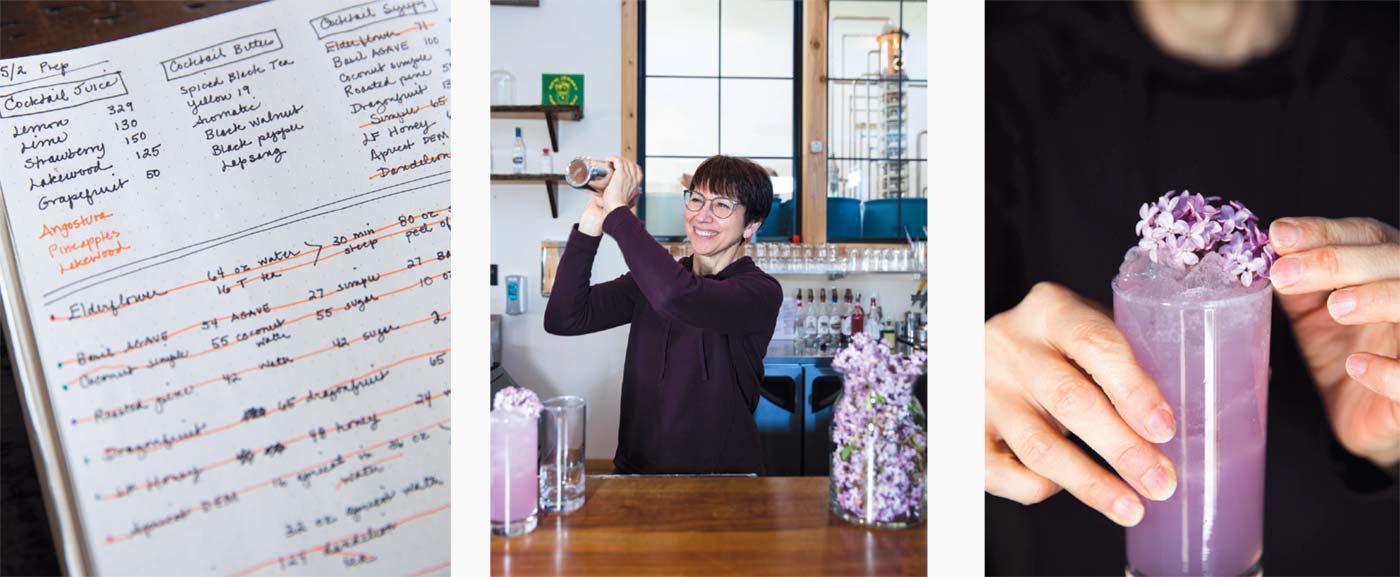
Cocktail Design: Finessing Flavor
When designing cocktails for Recklesstown Farm Distillery, Carla Camerieri (below, center) has limitations that help narrow the focus of her flavor explorations. One limitation is the desire to work with fresh, local, seasonal ingredients as much as possible. Another is the legal constraint against using alcohols that are produced elsewhere.
“At home, I can use any ingredient that I want,” Camerieri says. “Here, I am able to explore creativity as limited by what is available—which then really ends up not being a limit because there is just so much that you can do. And that has been the most fun part of all.”
Her cocktail design begins with a concept. Perhaps it’s a focus on floral cocktails for spring. Or a theme picked up from the featured book in Recklesstown’s book club—a monthly public event that always begins with a cocktail inspired by the selected book. Or, perhaps, it is a desire to capture a mood, as she did with her winter beet cocktail, Earthbound.
“What happens in January? We fold in, we want to be grounded,” Camerieri says. “So, what pulls us down to the earth? Beets—being that type of a vegetable—and potato vodka—being that type of a vodka. In that one, we even put a cherry mushroom syrup. That came from the idea of Pinot Noir being that earthy, cherry kind of flavor and knowing I could bring those two ingredients together.”
“NOT ONLY CAN WE CRAFT A COCKTAIL, BUT WE CAN CRAFT A COCKTAIL THAT HAS MEANING.”
As she experiments, Camerieri is pulling from a memory bank of flavors that she has developed through the habit and discipline of tasting. “Tasting is the key, no matter what you’re trying to learn in the spirit world,” she says. “If it is wine, you line five of them up and taste them. It is the same thing in learning how to make cocktails. It’s like creating a little catalog of flavors in your head so that then you know, ‘Clove and orange, they go together.’”
Once she has the basic cocktail designed, Camerieri focuses on balance, which she describes as both horizontal and vertical. Horizontal is the balance between acidity and sweetness. Vertical is the balance between power and nuance.
Power comes from the spirits. Too much overpowers the cocktail, covering over the flavor of the other ingredients. Too little and the cocktail lacks backbone. Nuance comes from the layers of flavors brought in through other ingredients, such as simple syrup, which can be infused with aromatics, such as rosemary, clove, coriander, mint, and tea.
“Teas are wonderful because teas also give you astringency. Black tea, green tea, or the floral teas—any of them can be converted into a syrup,” Camerieri says. “That tannic astringency will grab onto other flavors, particularly something that’s been aged in wood, and just completely elevate the drink.”
Once the cocktail is developed, Camerieri tastes it with the other members of the Recklesstown team. Together they tweak the drink until they are satisfied that it is ready to go on the menu.
Camerieri encourages experimentation by personalizing cocktails made at home. “If you are trying to make a cocktail to celebrate someone’s birthday, an anniversary, or a wedding,” she says, “you can think about those two people or that person and bring some things into the drink that suit their personalities or their marriage. It just adds another layer of depth to all of this. Not only can we craft a cocktail, but we can craft a cocktail that has meaning.” —F.M.
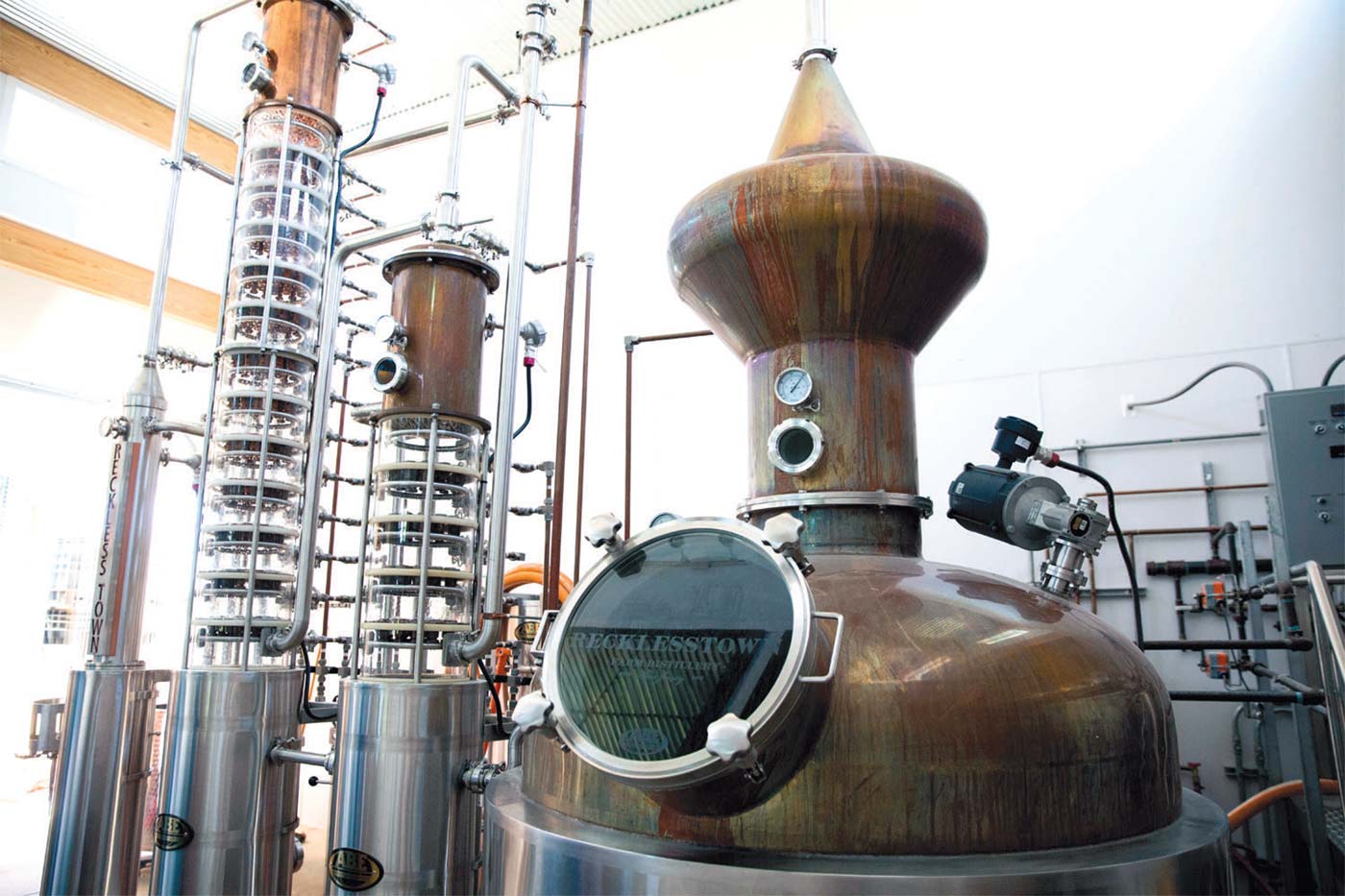
The Distilling Process
The still at Recklesstown is a hybrid still: three different stills in one, explains distiller Ben Donia. That is what allows him to make a variety of spirits, including vodka, which requires a high level of refinement to reach its Federally mandated colorless, odorless, flavorless state.
Simply put, spirits are ethanol that has been separated out of a fermented product. Here, for example, is a basic rundown on distilling spirits from corn:
- Making the Mash: Dried corn is milled and added, along with water, to the mash tun. That mixture is boiled, which gelatinizes the starch. An enzyme is then added that converts the starch to sugar. “Up to that point what we’ve essentially done is brew a beer,” Donia says. “It’s not a tasty beer that you would want to drink, but it is basically like corn beer. In distilling, we call it mash or wort.”
- Fermentation: The mash is put into the fermenter, yeast is added, and the mixture is allowed to ferment for about a week as the sugar converts to alcohol.
- Distillation: The fermented liquid is heated in the still to above 173°F, at which point the ethanol evaporates and the ethanol vapor travels up through the still. When cooled, the vapor returns to a liquid state and is collected.
